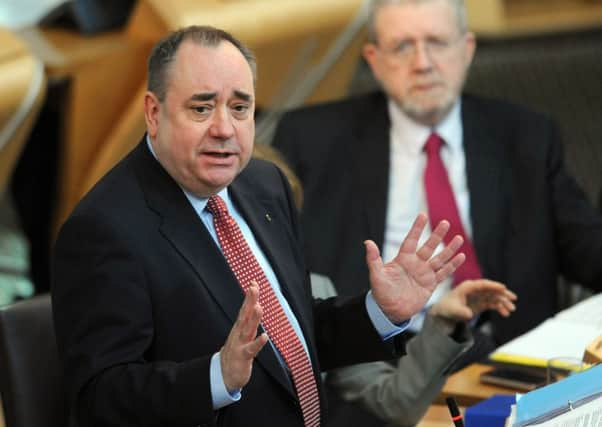BBC portrayed Alex Salmond as ‘figure of fun’


Professor John Robertson’s report claimed the organisation’s reporting was “unfair” to the Yes campaign, with Alex Salmond portrayed as a “figure of fun”.
But BBC chiefs told MSPs yesterday that the research contained factual errors, including confusing political party leaders, and it has since been amended.
Advertisement
Hide AdAdvertisement
Hide AdProf Robertson, of the University of the West of Scotland, said after the research was released he received an e-mail from Ian Small, head of public policy and corporate affairs at BBC Scotland, which “roundly criticised every aspect” of the work.
The academic told Holyrood’s education committee yesterday: “I would like to condemn the head of BBC Scotland’s department of policy and corporate affairs in suppressing the dissemination of my research and in circulating an insulting and ill-informed critique of my research direct to my principal, bypassing my head of school.”
He also criticised the “silence” of Scotland’s mainstream media in “disappearing” the research which has secured “massive” coverage online, as well as other academics over a lack of support.
“I interpret the above as an attempt at thought control in a democracy,” he said.
The research examined the early evening TV news coverage of STV News and BBC Reporting Scotland. It found an “imbalance” between the statements reported which were supportive of the Yes campaign and those supportive of the No campaign, by a ratio of about three to two.
Prof Robertson insisted this was not particularly significant, as it usually amounted to giving the three pro-Union parties a comment in stories alongside the SNP.
However, the tendency to begin with “bad news” stories relating to independence, such as on the economy and jobs, had a bigger impact on audiences, as well as the respect given to supposedly neutral organisations like the Institute of Fiscal Studies (IFS) which Prof Robertson described as “political animals”.
The “personalisation” of Alex Salmond in the media was also a key concern raised by the academic. He said: “It reminded me very strongly of how Michael Foot and Neil Kinnock were treated – made a fool of.”
Advertisement
Hide AdAdvertisement
Hide AdThe academic – who admitted he supported independence – said that Chancellor George Osborne has endured similar treatment in recent months.
BBC Scotland’s head of news and current affairs, John Boothman, denied the study had been suppressed, pointing out that Prof Robertson had discussed it on BBC Radio Scotland’s flagship morning news show and that it was debated in phone-ins.
Mr Boothman said the study contained “quite glaring” errors which had since been corrected in subsequent versions.
He said these included “factual errors about the date, people named as taking part in the report didn’t take part” and issues with the final summary.
BBC Scotland director Ken MacQuarrie said: “We completely reject the allegations about our news coverage, as we do the questioning of our journalists’ professionalism and what they have brought to air.
“The evidence it presents does not support the contentions that it makes and the conclusions are based largely on flawed analysis.”
STV director of channels Bobby Hain said: “We have an obligation under our licence to make sure our political coverage is always impartial and we take that very seriously.”
SEE ALSO